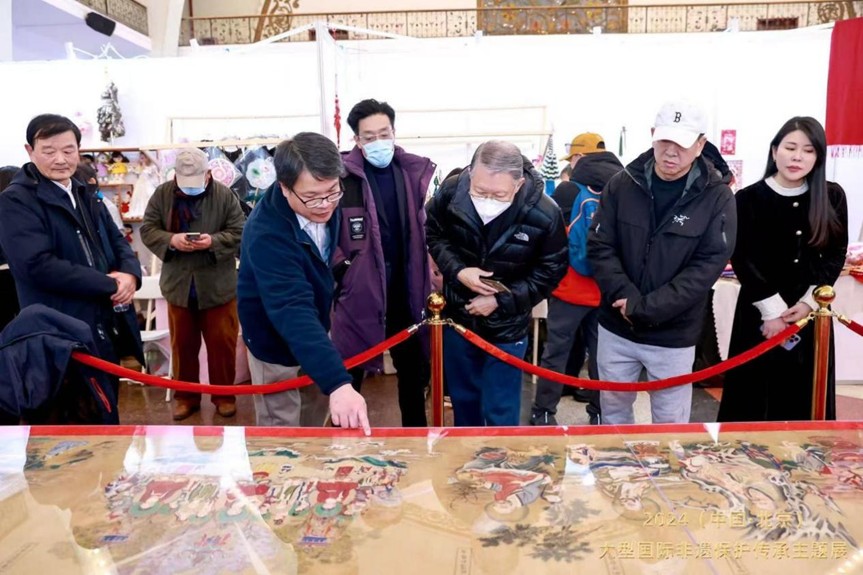New Delhi [India], December 31: On December 22, the three-day “Join Hands for the Future | Embracing Innovation Together – 2024 (China · Beijing) International Intangible Cultural Heritage Protection and Inheritance Theme Exhibition,” co-hosted by the Beijing International Art Fair Foundation and the China Next Generation Health and Sports Foundation, came to a successful close at the Beijing Exhibition Center.
The exhibition attracted participants from nearly 50 countries, including numerous intangible cultural heritage inheritors from China, as well as art collectors from China’s Taiwan region. It marked one of the largest, most comprehensive, and widest-reaching audio-visual art events in the history of international intangible cultural heritage exchange.
The third day of the International Intangible Cultural Heritage Exhibition continued to brim with enthusiasm, with crowds flowing in an endless stream. Visitors wandered through the exhibition halls as if navigating a vast galaxy of culture, fully immersed in the vibrant and diverse spectacle of intangible cultural heritage.
Over 60 treasures showcased in the traditional cuisine and craftsmanship section gleamed like timeless masterpieces, revealing their enduring charm through the ages. The rich aromas of specialty foods evoked poetic memories from the depths of time, while the graceful melodies and movements of musical and dance performances captured the essence of the cultural soul, weaving a splendid prelude to cultural fusion.
At this stage, friends from across the world connected deeply through their shared love for intangible heritage and music. They joined hands spontaneously, singing, dancing, and celebrating together with heartfelt joy, as if bound by an unbreakable familial connection.
Deepening international cooperation and strengthening the cultural ties of the “Belt and Road” initiative.
The International Intangible Cultural Heritage Exhibition gathered a rich and diverse range of intangible cultural heritage from countries along the Belt and Road, providing a platform for in-depth exchange and cooperation between different countries and regions. Through intangible heritage as a unique cultural medium, people from various nations have deepened their understanding and strengthened their friendships through the collision and fusion of cultures, making the cultural ties of the “Belt and Road” stronger and more resilient.
The exhibition had a profound impact through various forms such as wonderful exhibitions, artistic performances, forums, interactive exchanges, and charity auctions. It effectively raised public awareness about the protection and inheritance of intangible heritage, while strongly promoting innovation and development in the intangible heritage arts industry. According to statistics, the exhibition attracted tens of thousands of visitors. The audience not only appreciated the diversity of world cultures and felt the unique charm of cultural fusion but also enhanced their cultural literacy and strengthened their sense of national pride.
Two Sides of the Strait Collaborate to Foster Cultural Integration and Joint Development
The precious exhibits brought by collectors from Taiwan, such as ThePaper Long Scroll of Grand Imperial Procession, which fills a gap in domestic literature, were meticulously completed over three years by military painter Li Dacheng, using extensive historical documents to depict the magnificent scene of the 13th year of Emperor Qianlong’s reign. Another highlight was The Large Purple Copper Sculpture of Grand Imperial Procession, created over eight years by nearly 300 skilled craftsmen, as well as The legend of Buddhism silk painting created in the 32nd year of Emperor Qianlong’s reign, 257 years ago, by Qing court painter Ding Guanpeng. These exhibits showcase the cultural cohesion of the two sides of the Taiwan Strait, rooted in the same origin and heritage, deepening the emotional ties between the two sides and promoting collaborative development and cultural fusion.

Focusing on the inheritance, innovation, and protection of cultural heritage, leveraging technology to create immersive experiences.
At this exhibition, the organizers placed special emphasis on the inheritance, innovation, and protection of cultural heritage. On one hand, they carefully selected intangible cultural heritage works from around the world, ensuring that traditional skills and cultures were presented in their authentic form. On the other hand, they actively leveraged technology to create immersive experiences. Upon entering the exhibition hall, visitors could use cutting-edge technologies such as virtual reality and augmented reality to experience the stories and cultural meanings behind intangible heritage firsthand. The fusion of ancient heritage and modern technology provided visitors with a new sensory experience and opened up new paths for the inheritance and development of intangible cultural heritage.
The exhibition sparked widespread media attention, attracting the public to participate and experience the charm of intangible cultural heritage.
The successful hosting of this International Intangible Cultural Heritage Exhibition, which brought together the finest intangible heritage from around the world, attracted widespread attention from over 200 media outlets both domestically and internationally. The event became a hot topic in the cultural field, with numerous media outlets focusing their coverage on it. On display were nearly 10,000 intangible heritage works from across the globe. The organizers emphasized inheritance and innovation, using technology to create an immersive experience. The exhibition saw more than 30,000 professional attendees, and the public eagerly participated to experience the charm of intangible heritage.
This exhibition also served as a platform to drive the transformation of the intangible heritage market. With diverse transaction formats, including on-site sales and investments and donations, the exhibition generated an intention transaction value of over 600 million yuan, injecting new vitality into the global development of intangible cultural heritage.
Notably, 93-year-old intangible heritage inheritor Li Yingjie, accompanied by his apprentices, traveled from Shenyang to attend the exhibition despite his advanced age. With great emotion, he shook hands with Zhang Jun, Secretary-General of the Beijing International Art Expo Foundation, and said, “Thank you for giving me this precious opportunity to participate in such a heart-stirring international intangible heritage exhibition. This is a move in line with the people’s will, providing a stage for craftsmen to realize their dreams. I hope such events will continue, allowing the craftsmanship to shine for years to come.”
Promoting the transformation of the intangible heritage market and supporting the development of the industry ecosystem through the platform.
At the exhibition, we learned that promoting the transformation of the intangible heritage market is a key focus. The exhibition created a professional platform, where a rich selection of intangible heritage treasures connected with the market through various transaction formats, driving the transformation. At the same time, the platform integrated industry resources to support the healthy development of the intangible heritage industry ecosystem.
If you have any objection to this press release content, kindly contact pr.error.rectification@gmail.com to notify us. We will respond and rectify the situation in the next 24 hours.
